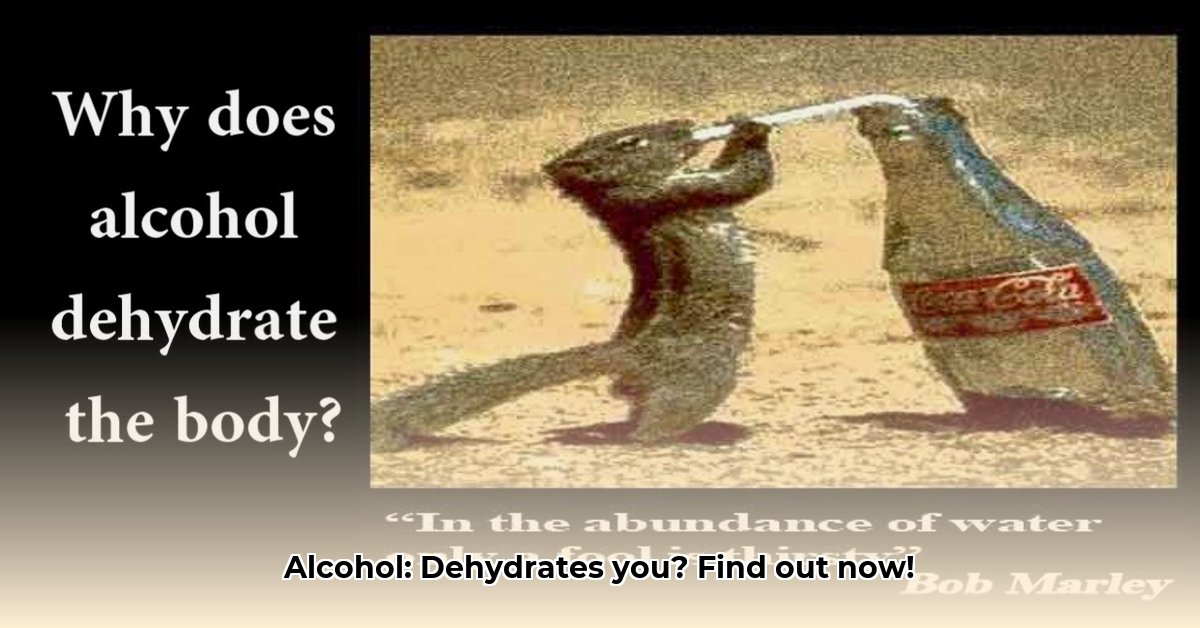Ever wake up after a night out feeling parched and awful? That’s not just a hangover; it’s your body screaming for water. Alcohol actually dehydrates you, and this guide will explain exactly why. We’ll break down the science in simple terms, explore how much and what kind of alcohol matters, and most importantly, give you practical tips to stay hydrated and avoid those dreaded hangover headaches. For more information on how medications can affect alcohol consumption, check out this helpful guide on medication interactions. We’ll cover everything from what to drink before, during, and after a night out to knowing when to seek help if things get serious. Let’s get you armed with the knowledge to enjoy your social life without the dehydration drama by learning prevention tips.
Does Alcohol Dehydrate You? Exploring the Science
Let’s face it: we’ve all experienced that dreaded hangover. Headache? Nausea? Extreme thirst? These are often telltale signs of dehydration, and alcohol is a major culprit. But how exactly does that pint of beer or glass of wine leave you feeling parched? Let’s dive in and explore does alcohol dehydrate you.
How Alcohol Makes You Dehydrated: The Vasopressin Connection
Alcohol’s dehydrating effect isn’t some mysterious process; it’s a direct consequence of how your body handles it. Your body has a sophisticated system for regulating fluids, and a key player is a hormone called vasopressin (or ADH). Think of vasopressin as your body’s “water conservation officer.” It signals your kidneys to hold onto water. Alcohol throws a wrench into this system by reducing the amount of vasopressin your body produces. With less of this water-saving hormone doing its job, your kidneys start producing more urine than usual. This means more water is flushed out of your system, leaving you dehydrated. It’s like your body is working overtime to eliminate the alcohol, and unfortunately, water gets swept away in the process.
What Makes the Dehydration Worse? Understanding Congeners
Several factors can intensify alcohol’s dehydrating power. Let’s consider a few key influences like understanding congeners:
- The Type of Drink: Darker spirits, like whiskey or bourbon, often contain higher levels of congeners – these are chemical compounds produced during fermentation. Some research suggests that congeners might contribute to a more severe hangover and potentially worsen dehydration. Light-colored drinks and lower-alcohol options are usually a safer bet.
- Alcohol Content (ABV): Drinks with a higher alcohol by volume (ABV) concentration have a greater diuretic effect, leading to more fluid loss.
- How Much You Drink: This is perhaps the most obvious factor. The more alcohol you consume, the more your body has to work to eliminate it, and the more water is likely to be lost through increased urination.
- Your Individual Metabolism: Everyone processes alcohol differently. Your body’s natural metabolism, along with your overall health, plays a role in your susceptibility to dehydration. Someone with a faster metabolism might feel the effects of dehydration more quickly, while others might be slower to notice.
- Pre-existing Conditions: If you’re already dehydrated from other reasons (not enough water intake, illness, etc.), alcohol’s impact will be significantly more pronounced. You’re starting from a disadvantage, making dehydration more likely.
- Caffeinated Alcoholic Beverages: Mixing alcohol with caffeine can mask the sedative effects of alcohol, leading to increased consumption and, consequently, greater dehydration.
- Sugary Mixers: Drinks with high sugar content can exacerbate dehydration. Sugar can also increase urination frequency.
Spotting the Signs of Alcohol-Induced Dehydration Symptoms and Issues
Dehydration’s symptoms can range from mild to severe. Knowing the signs can help you take appropriate measures for certain symptoms and issues.
Mild Dehydration: You might experience familiar hangover symptoms like thirst, dry mouth, fatigue, a headache, and perhaps some muscle aches. You may also notice dark-colored urine and decreased urination frequency.
Moderate Dehydration: Symptoms may include increased thirst, very dry mouth, dizziness, lightheadedness, and decreased skin elasticity.
Severe Dehydration: More intense symptoms indicate a serious concern and need prompt medical attention. These could include severe dizziness, lightheadedness, severe headaches, rapid heartbeat, confusion, disorientation, sunken eyes, and even vomiting, or fainting. Decreased blood pressure could also indicate severe dehydration. Don’t hesitate to seek medical help if you encounter these.
Preventing and Remedying Alcohol-Related Dehydration: Proactive Steps
Preventing dehydration is far easier than treating it. Here’s a proactive approach:
- Hydrate Before You Start: Don’t wait until you feel thirsty. Drink plenty of water before you start drinking alcohol. This creates a hydration cushion to help offset the dehydrating effects with an effective strategy.
- Alternate Alcoholic & Non-Alcoholic Drinks: Don’t just drink alcohol. Alternate alcoholic beverages with glasses of water, non-alcoholic beverages, or even herbal teas. This keeps a steady flow of fluids into your system.
- Choose the Right Drinks: Opt for drinks with lower alcohol content. Beer and wine generally have less alcohol than spirits like vodka, rum, or whiskey.
- Avoid Sugary and Caffeinated Mixers: Sugary drinks and caffeine can worsen dehydration. Choose mixers like soda water or plain water.
- Pace Yourself: Slow down. Give your body time to process the alcohol. Binge drinking dramatically increases the risk of severe dehydration. Aim to have no more than one standard drink per hour.
- Eat While You Drink: Food helps to slow alcohol’s absorption into your bloodstream. This might reduce the dehydrating impact, and it also helps prevent rapid blood sugar drops which can worsen a hangover. Choose foods rich in nutrients and electrolytes.
- Consider Electrolyte Drinks: After a night out, electrolyte drinks or broths can help replenish essential minerals lost through excessive urination. These are particularly helpful if you’ve been sweating (such as at a party or event). Look for options low in sugar.
- Avoid Exercising While Drinking: Combining alcohol with exercise can significantly increase dehydration.
When to See a Doctor: Recognizing Severe Symptoms
While mild dehydration responds to simple hydration strategies, severe dehydration warrants immediate medical attention. Seek help if you experience:
- Severe dizziness or lightheadedness that doesn’t improve with rest.
- Persistent vomiting that prevents you from keeping down fluids.
- A rapid or irregular heartbeat.
- Confusion or disorientation.
- Difficulty breathing.
- Seizures.
These symptoms suggest a more serious problem requiring professional medical assessment and treatment. Intravenous (IV) fluids might be necessary.
The Bottom Line: Responsible Consumption and Staying Informed
Alcohol dehydrates you, and understanding how and why this happens is paramount for making informed decisions about your alcohol consumption. Prioritize hydration, watch for dehydration symptoms, and remember moderation is key to enjoying a drink responsibly and protecting your health. Ongoing research continues to uncover the complexities of alcohol’s effects, so staying informed is important.
How to Best Rehydrate After Excessive Alcohol Consumption
Key Takeaways:
- Alcohol’s diuretic effect reduces your body’s ability to retain water, leading to dehydration.
- Dehydration from alcohol intensifies hangover symptoms like headaches and fatigue.
- Replenishing fluids and electrolytes is key to effective rehydration for a successful effect.
- The best strategy for how to best rehydrate after excessive alcohol consumption depends on individual needs and the severity of dehydration.
Understanding Alcohol’s Dehydrating Effect
Ever wonder why you wake up feeling parched after a night out? Alcohol acts as a diuretic (a substance that promotes increased urination), meaning it increases your urine output. This happens because alcohol interferes with the release of vasopressin (ADH), a hormone that helps your kidneys conserve water. With less ADH, your body flushes out more water than usual, leading to dehydration. It’s like your body’s plumbing system is working overtime to eliminate alcohol, taking valuable water with it.
Factors Influencing Dehydration: Alcohol by Volume (ABV)
Several factors influence how severely alcohol dehydrates you. The type of alcohol matters – higher alcohol-by-volume (ABV) drinks generally lead to more significant dehydration. The quantity consumed is critical; more alcohol equals more dehydration. Personal factors, such as your metabolism and pre-existing health conditions, also play a role. Even the presence of congeners (chemicals formed during alcohol production) can exacerbate dehydration, said Healthline.
Recognizing the Signs: Mild to Severe Dehydration Issues
Mild dehydration might manifest as thirst, dry mouth, or a headache. More severe dehydration could involve dizziness, rapid heartbeat, or even confusion. Pay attention to your body. These symptoms aren’t just a mild inconvenience; they’re warnings to seek medical attention. Monitor urine color – dark urine indicates dehydration.
Effective Rehydration Strategies: Electrolyte Balance
So, how to best rehydrate after excessive alcohol consumption? It’s a multi-pronged approach depending on electrolyte balance.
- Hydrate proactively: Drink plenty of water before, during, and after consuming alcohol.
- Choose wisely: Opt for lower-ABV beverages.
- Pace yourself: Don’t gulp drinks; spread your consumption over a longer period of time to minimize any dehydration issues.
- Eat while you drink: Food
- Stainless Steel Food Storage for Healthier, Eco-Friendly Meal Prep - February 27, 2026
- Stainless Food Containers Offer Durable Storage for Everyday Meals - February 26, 2026
- Stainless Steel Containers Offer Superior Food Preservation and Durability - February 25, 2026










